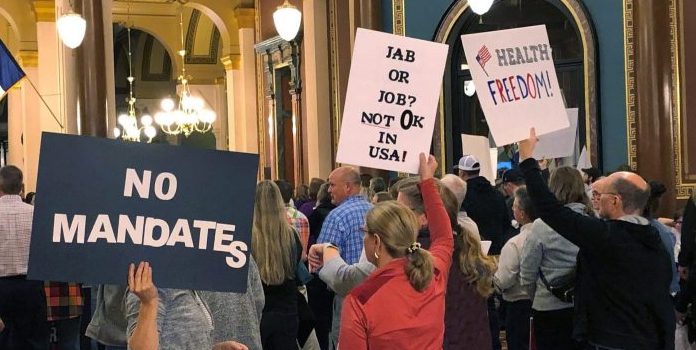(Headline USA) The Supreme Court is taking up two major cases involving the Biden administration’s controversial efforts to mandate experimental COVID-19 vaccines for many US workers.
The justices were hearing arguments Friday about whether to allow the administration to enforce a vaccine-or-testing requirement that applies to large employers and a separate vaccine mandate for most health care workers. The arguments were expected to last at least two hours.
Legal challenges to the policies from Republican-led states and business groups are in their early stages, but the outcome at the high court probably will determine the fate of vaccine requirements affecting more than 80 million people.
“I think effectively what is at stake is whether these mandates are going to go into effect at all,” said Sean Marotta, a Washington lawyer whose clients include the American Hospital Association. The trade group is not involved in the Supreme Court cases.
The challengers argue that the vaccine rules exceed the administration’s authority, but Solicitor General Elizabeth Prelogar, the administration’s top Supreme Court lawyer, wrote that both are needed to avoid unnecessary hospitalizations and deaths.
Keeping the vaccine mandate for health care workers on hold “will likely result in hundreds or thousands of deaths and serious illnesses from COVID-19 that could otherwise be prevented,” Prelogar wrote.
Only about 207 million Americans, 62.3% of the population, are “fully vaccinated,” according to the most recent definition, and roughly a third of the country has received a booster shot, including the nine justices.
However, the Centers for Disease Control and Prevention recently changed its definition for “fully vaccinated” from one or two shots to whatever it deems to be an “up-to-date” number of shots, ad infinitum.
The court said Friday that Justice Sonia Sotomayor would not be on the bench with her colleagues, opting instead to take part remotely from her office at the court. Sotomayor, who has had diabetes since childhood, has been the only justice who wore a mask to previous argument sessions in the courtroom.
The high court will be weighing in on administration vaccine policies for the first time, although the justices have turned away pleas to block state-level mandates.
The court did bring an end, however, to the federal moratorium on evictions put in place because of the pandemic, expressing concerns about federal overreach.
Three centrists on the bench—Chief Justice John Roberts and Justices Brett Kavanaugh and Amy Coney Barrett—probably hold the key to the outcome, Marotta said.
They broke with the other justices on the right over state mandates for health-care workers, but joined them to allow evictions to resume.
Both vaccine rules will exacerbate labor shortages and be costly to businesses, opponents said.
“People are going to quit. It will make a bad situation worse and they’re not going to come back,” said Karen Harned, executive director of the National Federation of Independent Business’ Small Business Legal Center.
Her group is among those challenging an emergency rule adopted by the Occupational Safety and Health Administration, under which workers at businesses with 100 or more employees must be vaccinated or get tested weekly and wear masks while working. The rule has exceptions for those who work alone or mostly outdoors.
The OSHA rule is supposed to take effect Monday, although the agency has said it would not impose fines on businesses that don’t comply before late February.
The vaccine mandate, for its part, applies to virtually all health care staff in the country. It covers health care providers that receive federal Medicare or Medicaid funding, potentially affecting 76,000 health care facilities as well as home health care providers. The rule has medical and religious exemptions.
Decisions by federal appeals courts in New Orleans and St. Louis have blocked the mandate in about half the states. The administration has said it is taking steps to enforce it in the rest.
Both cases are coming to the court on an emergency basis, and the court took the unusual step of scheduling arguments rather than just ruling on briefs submitted by the parties. Unlike in other cases the court hears, a decision from the justices could come in weeks if not days.
Because of the pandemic the justices will hear the cases in a courtroom closed to the public. Only the justices, lawyers involved in the cases, court staff and journalists will be present.
The public can listen live, however, a change made earlier in the pandemic when the justices for nearly 19 months heard cases via telephone.
Several news outlets are also live-streaming the arguments.
LIVE: Supreme Court Hears Arguments on Biden Administration Vaccine Mandateshttps://t.co/RmPRkipQGl
— Ir0nbelly (@Ir0nbelly) January 7, 2022
Adapted from reporting by the Associated Press

